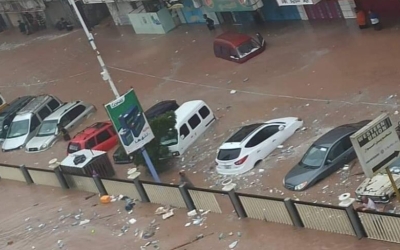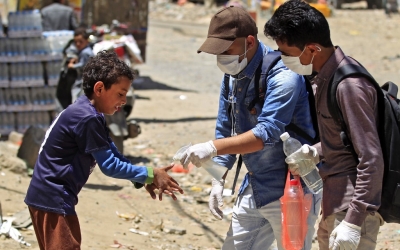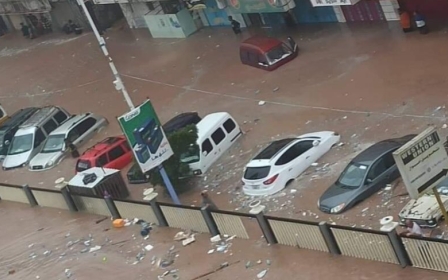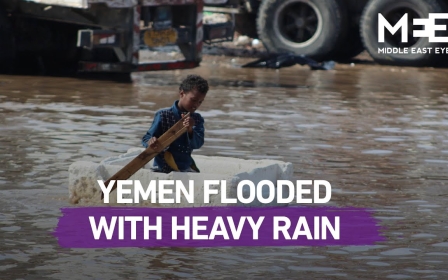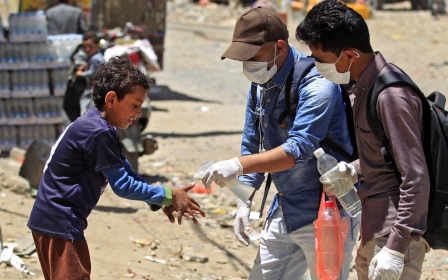'The floods washed away my sheep': Displaced Yemenis worst hit by deadly downpours
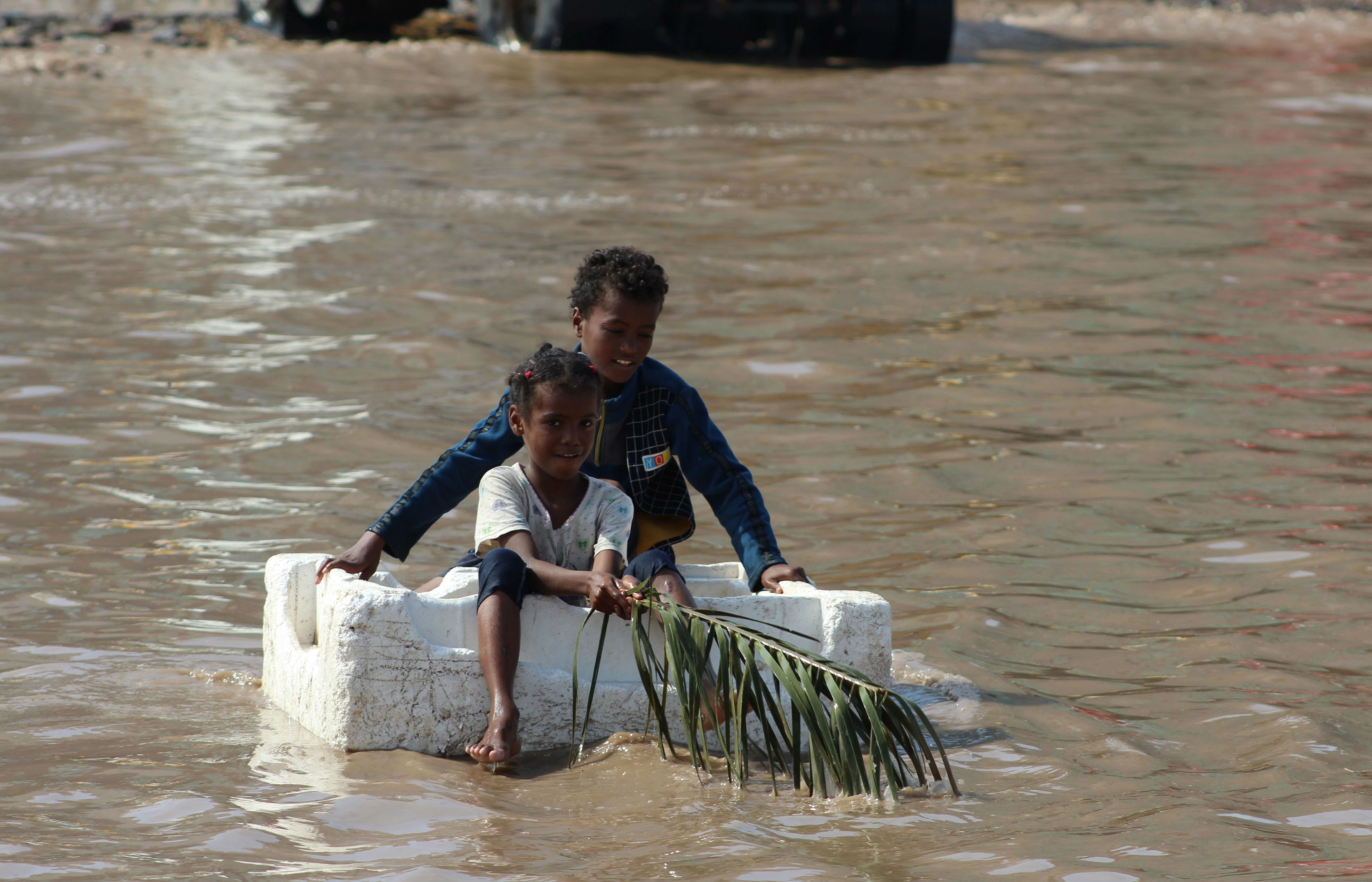
Driven out by fighting, Hamoud Ayyash and his family fled their house in Yemen's Hajjah in 2015, settling down in a camp for internally displaced people in the same governorate and building an 'osha' - a straw hut.
Now in his 50s, Ayyash has been living in the osha in the Abs district with his wife and four children ever since, and while he is not happy with his life, he says he does not have any other choice.
Ayyash had heard about floods destroying the oshas of other displaced families not far from his own, but he thought that he was in a safe place.
But as soon as floods started in his area last week, he realised he was not safe.
Heavy rains and flooding have significantly affected thousands of internally displaced Yemenis across the country, from the capital Sanaa and nearby Marib to Ibb and Aden further south.
As Yemeni government authorities have called on the international community to provide aid to those affected by the floods, some Yemenis have blamed unchecked construction for aggravating the impact of the rainy season in a country already struggling with the impact of more than five years of war.
Blocked by landowners
Ayyash has depended for the past five years on aid organisations for survival, as well as on his five sheep, one of his few possessions, to help provide for his family.
“In 2015, the war forced me to flee my house, leaving everything behind me as our lives were the most important thing for us,” Ayyash told Middle East Eye.
But floods have now stripped him of the little he owned.
“On Thursday, the floods came heavily and destroyed our osha instantly, I could do nothing but flee to another, safer osha,” Ayyash recalled.
“The rains continued for four hours and then I returned to check my osha.”
Ayyash returned to a scene of devastation. “The floods washed away my sheep and I could not save them. The food I received from organisations was damaged. The whole osha was destroyed,” he said,
Ayyash's osha was just one of hundreds destroyed by floods during the past week. Since then, he and his family have been living in a neighbouring osha until they can find an alternative.
According to United Nations refugee agency the UNHCR, many families like Ayyash's have lost both their shelter and everything they own.
The UNHCR said it was undertaking an emergency response to help hundreds of families, providing them with tents, mattresses and blankets.
The UN Office for the Coordination of Humanitarian Affairs (OCHA) said aid agencies were currently working with local authorities to assess needs and provide immediate assistance.
“We are displaced people in this area and we lost all what we have so we call on organisations and authorities to help us to get food and set up new oshas in a safe place,” Ayyash said.
He says he knows that he set up his osha in an area where there was a chance rainwater could cause flooding, but says as displaced people with no other relatives he had little choice.
“We tried to set up oshas in safe areas but the owners of the lands prevented us to do so, so we resorted to settle down in the way of floods.”
Death toll
Fourteen people, including at least five children, were killed and dozens injured in flash floods in the southern city of Aden, officials said on Wednesday.
The deaths took the nationwide toll to at least 21 after the OCHA said that seven other people - five women and two children - were killed by flooding in the north.
In Sanaa, two people were reportedly washed away in al-Sabain district, while in Old Sanaa a house collapsed and other properties were damaged.
Heavy rain and high winds hit Marib province on 15 April, damaging parts of Marib city and 16 sites for internally displaced people (IDPs) across the province, according to Yemen's Executive Unit for IDPs (ExU).
Authorities have declared the situation a disaster in Aden, where floods caused casualties and widespread damage to infrastructure and property.
At least 35 families in Yemen's second city were said to be trapped in their homes on Wednesday, their houses drowned in water and mud. Hundreds of vehicles were stranded in the middle of flood-soaked streets.
Last week, Prime Minister Maeen Abdulmalik Saeed - of the government of exiled President Abd Rabbu Mansour Hadi - called on neighbouring countries to provide emergency support to his government's temporary capital after security officials said eight people had died, including four children, due to the downpours.
"Aden is a disaster area. We call on brotherly and friendly countries and relief organisations to extend a helping hand and help the government face this crisis and contain its devastating effects," Saeed said on Twitter.
Government blamed
Residents of Aden have accused the government of being behind one of the main reasons for the damage caused by the flooding by allowing random buildings to be constructed in the city.
Abdulqawi al-Haj, a resident of the Crater neighbourhood in Aden, one of the areas most affected by the floods, had his own house flooded on 21 April.
“When the floods started to hit the area, I took the most important things and left the house and this is what other neighbours did as our houses are in a dangerous place,” he told MEE.
'We need a government that plans well and not a government that begs well'
- Abdulqawi al-Haj, Aden resident
“I’m 56 years old and I have never witnessed floods like these in Aden as the city used to be organised and no one could build in the way of the rainwater.”
Haj attributed the main reason for the floods to new buildings constructed in the path of the rainwater in the past two years.
“The government allowed officials and rich people to build new houses in the way of the rainwater, so the rainwater can no longer go smoothly to the sea but instead runs towards the old houses," he said.
“Our government is killing us with their random construction and then begging other countries to help. We need a government that plans well and not a government that begs well.”
Haj, who lost most of the furniture in his old house, is demanding the government compensate him and others similarly affected in Aden.
Photos and videos from Marib also showed that floods had destroyed new houses built in the way of the rainwater.
Disaster plan
A source in the Ministry of Information told MEE that the government was doing its best to help those affected by the flooding in all provinces, with help from organisations and other countries.
“The PM called on neighbouring countries and organisations to help the flood-affected people. Saudi Arabia responded to that appeal and it will help affected people in some provinces like Marib,” the source said.
Saudi Arabia leads a western-backed military coalition that has intervened in Yemen since 2015 to restore Hadi's government, which had been kicked out of power in Sanaa by Houthi rebels in 2015.
The source, who spoke anonymously, said that organisations had already started to implement a plan to respond to the disaster and that some people in Marib and Hajjah had received aid.
“The government cannot do anything against natural phenomenons but to help affected people,” he said.
“This happened last year in Aden, Hajjah and other provinces, and organisations helped victims.”
The source admitted that some people had built houses in the wrong places, but said it was not the proper time to condemn them for that mistake.
“Random building in Marib was a reason for people being placed in dangerous areas, but I hope the relevant offices in the provinces will solve this problem in the future,” he said.
'The floods may wash us away'
Natheer Nouri, a 30-something resident of Hajjah’s Abs district, said floods there had destroyed more than 1,000 oshas and that many more were still in danger.
“The best way to solve this problem now is for authorities to provide displaced people with safe alternatives where they can set up their oshas, otherwise we will see more victims in the coming weeks,” he told MEE.
Ayyash, still living with his family in Abs, said: “We are still in the beginning of the rainy season and if organisations and authorities do not help, the floods may wash us away.
“We do not need anything more than safe shelter and food. We saved ourselves from fighting, but we cannot save ourselves from floods and hunger.”
With additional reporting from Hajjah.
Middle East Eye propose une couverture et une analyse indépendantes et incomparables du Moyen-Orient, de l’Afrique du Nord et d’autres régions du monde. Pour en savoir plus sur la reprise de ce contenu et les frais qui s’appliquent, veuillez remplir ce formulaire [en anglais]. Pour en savoir plus sur MEE, cliquez ici [en anglais].


